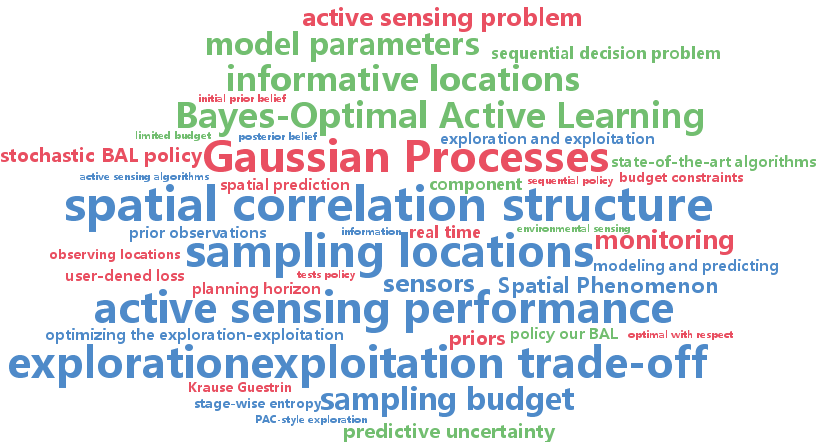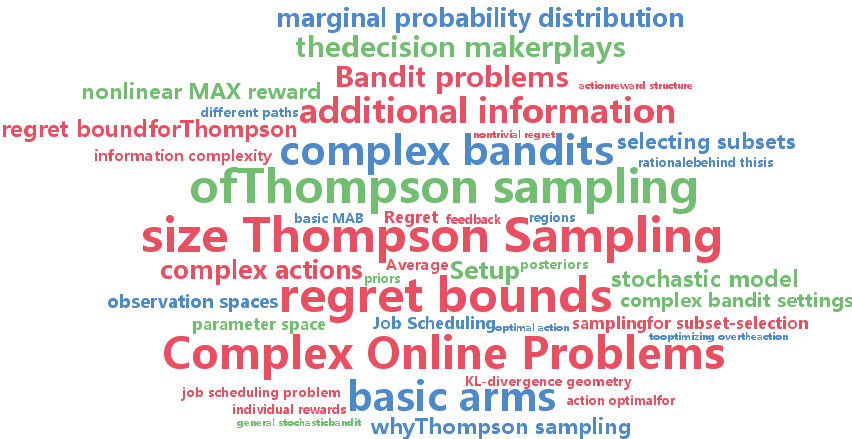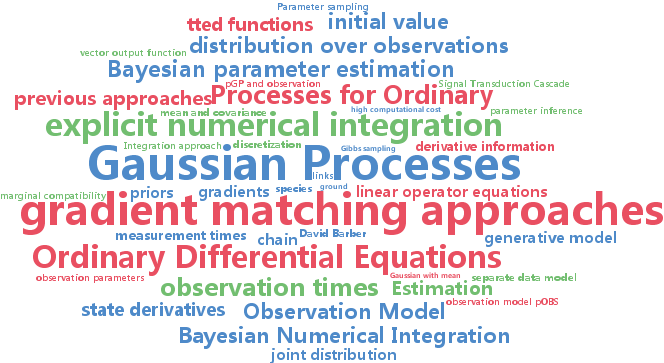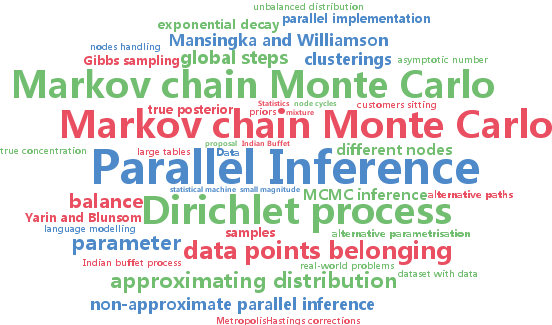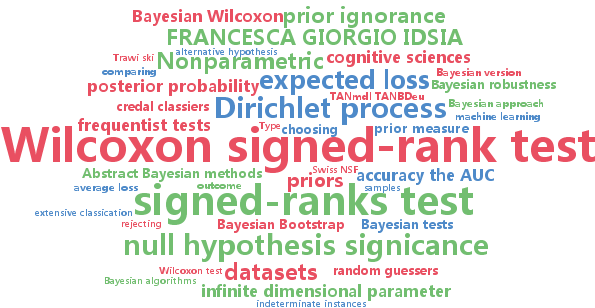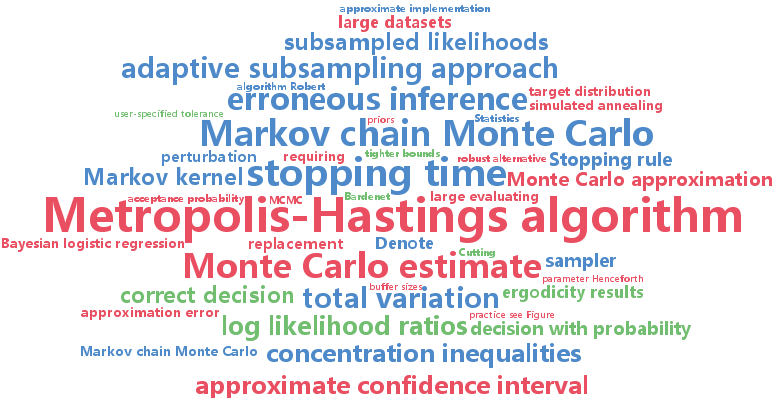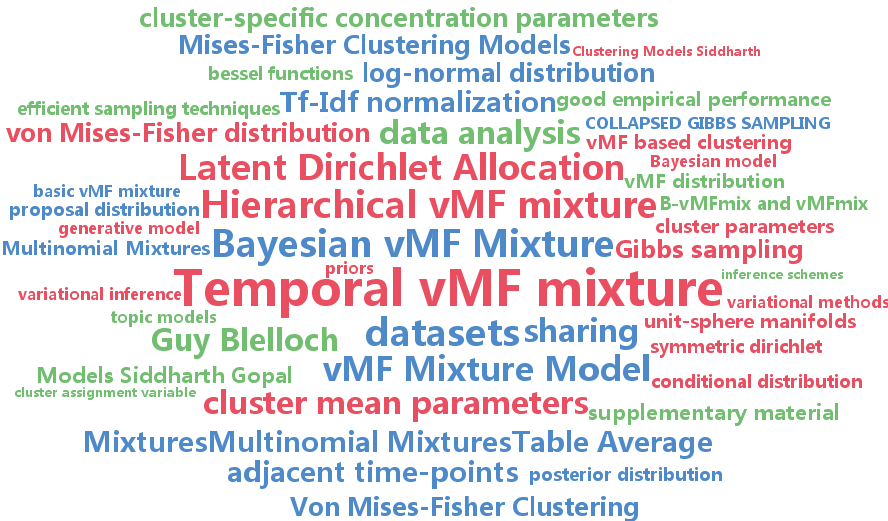priors
-
Trong Nghia Hoang and Bryan Kian Hsiang Low and Patrick Jaillet and Mohan Kankanhalli
Nonmyopic $\epsilon$-Bayes-Optimal Active Learning of Gaussian Processes (pdf)
A fundamental issue in active learning of Gaussian processes is that of the exploration-exploitation trade-off. This paper presents a novel nonmyopic $\epsilon$-Bayes-optimal active learning ($\epsilon$-BAL) approach that jointly and naturally optimizes the trade-off. In contrast, existing works have primarily developed myopic/greedy algorithms or performed exploration and exploitation separately. To perform active learning in real time, we then propose an anytime algorithm based on $\epsilon$-BAL with performance guarantee and empirically demonstrate using synthetic and real-world datasets that, with limited budget, it outperforms the state-of-the-art algorithms.
-
David Knowles and Zoubin Ghahramani and Konstantina Palla
A reversible infinite HMM using normalised random measures (pdf)
We present a nonparametric prior over reversible Markov chains. We use completely random measures, specifically gamma processes, to construct a countably infinite graph with weighted edges. By enforcing symmetry to make the edges undirected we define a prior over random walks on graphs that results in a reversible Markov chain. The resulting prior over infinite transition matrices is closely related to the hierarchical Dirichlet process but enforces reversibility. A reinforcement scheme has recently been proposed with similar properties, but the de Finetti measure is not well characterised. We take the alternative approach of explicitly constructing the mixing measure, which allows more straightforward and efficient inference at the cost of no longer having a closed form predictive distribution. We use our process to construct a reversible infinite HMM which we apply to two real datasets, one from epigenomics and one ion channel recording.
-
Aditya Gopalan and Shie Mannor and Yishay Mansour
Thompson Sampling for Complex Online Problems (pdf)
We consider stochastic multi-armed bandit problems with complex actions over a set of basic arms, where the decision maker plays a complex action rather than a basic arm in each round. The reward of the complex action is some function of the basic arms' rewards, and the feedback observed may not necessarily be the reward per-arm. For instance, when the complex actions are subsets of the arms, we may only observe the maximum reward over the chosen subset. Thus, feedback across complex actions may be coupled due to the nature of the reward function. We prove a frequentist regret bound for Thompson sampling in a very general setting involving parameter, action and observation spaces and a likelihood function over them. The bound holds for discretely-supported priors over the parameter space and without additional structural properties such as closed-form posteriors, conjugate prior structure or independence across arms. The regret bound scales logarithmically with time but, more importantly, with an improved constant that non-trivially captures the coupling across complex actions due to the structure of the rewards. As applications, we derive improved regret bounds for classes of complex bandit problems involving selecting subsets of arms, including the first nontrivial regret bounds for nonlinear MAX reward feedback from subsets. Using particle filters for computing posterior distributions which lack an explicit closed-form, we present numerical results for the performance of Thompson sampling for subset-selection and job scheduling problems.
-
Creighton Heaukulani and David Knowles and Zoubin Ghahramani
Beta Diffusion Trees (pdf)
We define the beta diffusion tree, a random tree structure with a set of leaves that defines a collection of overlapping subsets of objects, known as a feature allocation. The generative process for the tree is defined in terms of particles (representing the objects) diffusing in some continuous space, analogously to the Dirichlet and Pitman-Yor diffusion trees (Neal, 2003b; Knowles & Ghahramani, 2011), both of which define tree structures over clusters of the particles. With the beta diffusion tree, however, multiple copies of a particle may exist and diffuse to multiple locations in the continuous space, resulting in (a random number of) possibly overlapping clusters of the objects. We demonstrate how to build a hierarchically-clustered factor analysis model with the beta diffusion tree and how to perform inference over the random tree structures with a Markov chain Monte Carlo algorithm. We conclude with several numerical experiments on missing data problems with data sets of gene expression arrays, international development statistics, and intranational socioeconomic measurements.
-
David Barber and Yali Wang
Gaussian Processes for Bayesian Estimation in Ordinary Differential Equations (pdf)
Bayesian parameter estimation in coupled ordinary differential equations (ODEs) is challenging due to the high computational cost of numerical integration. In gradient matching a separate data model is introduced with the property that its gradient can be calculated easily. Parameter estimation is achieved by requiring consistency between the gradients computed from the data model and those specified by the ODE. We propose a Gaussian process model that directly links state derivative information with system observations, simplifying previous approaches and providing a natural generative model.
-
Yarin Gal and Zoubin Ghahramani
Pitfalls in the use of Parallel Inference for the Dirichlet Process (pdf)
Recent work done by Lovell, Adams, and Mansingka (2012) and Williamson, Dubey, and Xing (2013) has suggested an alternative parametrisation for the Dirichlet process in order to derive non-approximate parallel MCMC inference for it work which has been picked-up and implemented in several different fields. In this paper we show that the approach suggested is impractical due to an extremely unbalanced distribution of the data. We characterise the requirements of efficient parallel inference for the Dirichlet process and show that the proposed inference fails most of these requirements (while approximate approaches often satisfy most of them). We present both theoretical and experimental evidence, analysing the load balance for the inference and showing that it is independent of the size of the dataset and the number of nodes available in the parallel implementation. We end with suggestions of alternative paths of research for efficient non-approximate parallel inference for the Dirichlet process.
-
Alessio Benavoli and Giorgio Corani and Francesca Mangili and Marco Zaffalon and Fabrizio Ruggeri
A Bayesian Wilcoxon signed-rank test based on the Dirichlet process (pdf)
Bayesian methods are ubiquitous in machine learning. Nevertheless, the analysis of empirical results is typically performed by frequentist tests. This implies dealing with null hypothesis significance tests and p-values, even though the shortcomings of such methods are well known. We propose a nonparametric Bayesian version of the Wilcoxon signed-rank test using a Dirichlet process (DP) based prior. We address in two different ways the problem of how to choose the infinite dimensional parameter that characterizes the DP. The proposed test has all the traditional strengths of the Bayesian approach; for instance, unlike the frequentist tests, it allows verifying the null hypothesis, not only rejecting it, and taking decision which minimize the expected loss. Moreover, one of the solutions proposed to model the infinitedimensional parameter of the DP, allows isolating instances in which the traditional frequentist test is guessing at random. We show results dealing with the comparison of two classifiers using real and simulated data.
-
Rémi Bardenet and Arnaud Doucet and Chris Holmes
Towards scaling up Markov chain Monte Carlo: an adaptive subsampling approach (pdf)
Markov chain Monte Carlo (MCMC) methods are often deemed far too computationally intensive to be of any practical use for large datasets. This paper describes a methodology that aims to scale up the Metropolis-Hastings (MH) algorithm in this context. We propose an approximate implementation of the accept/reject step of MH that only requires evaluating the likelihood of a random subset of the data, yet is guaranteed to coincide with the accept/reject step based on the full dataset with a probability superior to a user-specified tolerance level. This adaptive subsampling technique is an alternative to the recent approach developed in (Korattikara et al, ICML'14), and it allows us to establish rigorously that the resulting approximate MH algorithm samples from a perturbed version of the target distribution of interest, whose total variation distance to this very target is controlled explicitly. We explore the benefits and limitations of this scheme on several examples.
-
Zhiyuan Chen and Bing Liu
Topic Modeling using Topics from Many Domains, Lifelong Learning and Big Data (pdf)
Topic modeling has been commonly used to discover topics from document collections. However, unsupervised models can generate many incoherent topics. To address this problem, several knowledge-based topic models have been proposed to incorporate prior domain knowledge from the user. This work advances this research much further and shows that without any user input, we can mine the prior knowledge automatically and dynamically from topics already found from a large number of domains. This paper first proposes a novel method to mine such prior knowledge dynamically in the modeling process, and then a new topic model to use the knowledge to guide the model inference. What is also interesting is that this approach offers a novel lifelong learning algorithm for topic discovery, which exploits the big (past) data and knowledge gained from such data for subsequent modeling. Our experimental results using product reviews from 50 domains demonstrate the effectiveness of the proposed approach.
-
Siddharth Gopal and Yiming Yang
Von Mises-Fisher Clustering Models (pdf)
This paper proposes a suite of models for clustering high-dimensional data on a unit sphere based on Von Mises-Fisher (vMF) distribution and for discovering more intuitive clusters than existing approaches. The proposed models include a) A Bayesian formulation of vMF mixture that enables information sharing among clusters, b) a Hierarchical vMF mixture that provides multi-scale shrinkage and tree structured view of the data and c) a Temporal vMF mixture that captures evolution of clusters in temporal data. For posterior inference, we develop fast variational methods as well as collapsed Gibbs sampling techniques for all three models. Our experiments on six datasets provide strong empirical support in favour of vMF based clustering models over other popular tools such as K-means, Multinomial Mixtures and Latent Dirichlet Allocation.
-
Tien Vu Nguyen and Dinh Phung and Xuanlong Nguyen and Swetha Venkatesh and Hung Bui
Bayesian Nonparametric Multilevel Clustering with Group-Level Contexts (pdf)
We present a Bayesian nonparametric framework for multilevel clustering which utilizes group-level context information to simultaneously discover low-dimensional structures of the group contents and partitions groups into clusters. Using the Dirichlet process as the building block, our model constructs a product base-measure with a nested structure to accommodate content and context observations at multiple levels. The proposed model possesses properties that link the nested Dirichlet processes (nDP) and the Dirichlet process mixture models (DPM) in an interesting way: integrating out all contents results in the DPM over contexts, whereas integrating out group-specific contexts results in the nDP mixture over content variables. We provide a Polya-urn view of the model and an efficient collapsed Gibbs inference procedure. Extensive experiments on real-world datasets demonstrate the advantage of utilizing context information via our model in both text and image domains.
